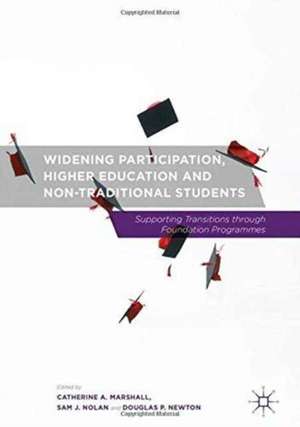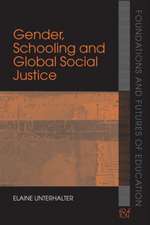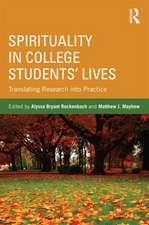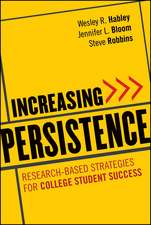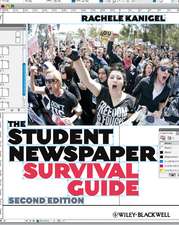Widening Participation, Higher Education and Non-Traditional Students: Supporting Transitions through Foundation Programmes
Editat de Catherine A. Marshall, Sam J. Nolan, Douglas P. Newtonen Limba Engleză Hardback – 5 oct 2016
This book highlights the problems that have developed as students lack either the social or cultural capital to take the opportunity of Higher Education through conventional routes. This might be due to leaving school early, lacking entry qualifications or wanting to further their education and prospects after entering the workplace. Foundation courses help to widen participation and create a route towards higher education. This book offers tried and tested practical solutions, from the notion of widening participation, to recruitment of students and to ways of helping them to make the most of themselves and develop the skills they need to progress on degree courses of their choice.
| Toate formatele și edițiile | Preț | Express |
|---|---|---|
| Paperback (1) | 381.81 lei 6-8 săpt. | |
| Palgrave Macmillan UK – 27 iun 2018 | 381.81 lei 6-8 săpt. | |
| Hardback (1) | 386.81 lei 6-8 săpt. | |
| Palgrave Macmillan UK – 5 oct 2016 | 386.81 lei 6-8 săpt. |
Preț: 386.81 lei
Nou
Puncte Express: 580
Preț estimativ în valută:
74.03€ • 76.100$ • 61.11£
74.03€ • 76.100$ • 61.11£
Carte tipărită la comandă
Livrare economică 14-28 aprilie
Preluare comenzi: 021 569.72.76
Specificații
ISBN-13: 9781349949687
ISBN-10: 134994968X
Pagini: 199
Ilustrații: XIX, 198 p. 14 illus.
Dimensiuni: 148 x 210 x 18 mm
Greutate: 0.39 kg
Ediția:1st ed. 2016
Editura: Palgrave Macmillan UK
Colecția Palgrave Macmillan
Locul publicării:London, United Kingdom
ISBN-10: 134994968X
Pagini: 199
Ilustrații: XIX, 198 p. 14 illus.
Dimensiuni: 148 x 210 x 18 mm
Greutate: 0.39 kg
Ediția:1st ed. 2016
Editura: Palgrave Macmillan UK
Colecția Palgrave Macmillan
Locul publicării:London, United Kingdom
Cuprins
Foreword.- Preface.- Chapter 1. Barriers to Accessing Higher Education; Catherine Marshall.- Chapter 2. Understanding Foundation Year Provision; Steve Leech, Catherine Marshall and Geoff Wren .- Chapter 3. Language Issues Facing Non-Traditional Students: Some Problems and Solutions; Megan Bruce, Simon Rees and Julie Wilson.- Chapter 4. Teaching Mathematics to Adults: Integrating New and Old Knowledge; Mary Dodd, Jean Mathias and Sam Nolan.- Chapter 5. Breaking Barriers: Overcoming Anxieties in Practical Science; Sam Nolan, Simon Rees and Carole Rushall.- Chapter 6. Selecting Mature Learners: A Toolkit for Admissions Tutors; Ian Moreton.- Chapter 7. Challenges and Opportunities in Using Facebook to Build a Community for Students at a UK University; Nick Pearce and Sarah Learmonth.- Chapter 8. Engendering an Online Community: Supporting Students on the Transition into UniversityLife; Sam Nolan, Megan Bruce & Steve Leech.- Chapter 9. Culture Shock: Applying the Lessons from International Student Acculturation to Non-Traditional Students; Catherine Marshall and Jean Mathias.- Chapter 10. Students’ Academic Emotions, Their Effects and Some Suggestions for Teaching Practices; Douglas P. Newton.- Chapter 11.Adjusting Teaching Practices for Mature Adults to Incorporate Understandings of Affective Processes and Self-Efficacy in Mathematics; Mary D. Dodd.- Chapter 12. Upwards Trajectories; Catherine Marshall.
Notă biografică
Catherine A. Marshall is the Director of the Foundation Centre at Durham University, UK where she promotes the development of an evidenced-based body of scholarly activity to underpin the delivery of programmes designed to provide a route into Higher Education for non-traditional students. She is the Chair of the National Foundation Year Network.
Douglas P. Newton is Professor in the School of Education at Durham University, UK. His books and articles attract international interest. Recent successes include Teaching for Understanding, and the much acclaimed Thinking with Feeling, described as a Copernican shift in the notion of teaching.
Sam J. Nolan is the Assistant Director of the Centre for Academic, Researcher and Organisation Development at Durham University, UK. From 2010-2015 Sam worked as a Physics Teaching Fellow, then Head of Scholarship at the Foundation Centre, where he supported the Centre in developing and promoting its scholarly profile.
Textul de pe ultima copertă
This book highlights the problems that have developed as students lack either the social or cultural capital to take the opportunity of Higher Education through conventional routes. This might be due to leaving school early, lacking entry qualifications or wanting to further their education and prospects after entering the workplace. Foundation courses help to widen participation and create a route towards higher education. This book offers tried and tested practical solutions, from the notion of widening participation, to recruitment of students and to ways of helping them to make the most of themselves and develop the skills they need to progress on degree courses of their choice.
Sam J. Nolan is the Assistant Director of the Centre for Academic, Researcher and Organisation Development at Durham University, UK. From 2010-2015 Sam worked as a Physics Teaching Fellow, then Head of Scholarship at the Foundation Centre, where he supported the Centre in developing and promoting its scholarly profile.
Catherine A. Marshall is the Director of the Foundation Centre at Durham University, UK where she promotes the development of an evidenced-based body of scholarly activity to underpin the delivery of programmes designed to provide a route into Higher Education for non-traditional students. She is the Chair of the National Foundation Year Network.
Douglas P. Newton is Professor in the School of Education at Durham University, UK. His books and articles attract international interest. Recent successes include Teaching for Understanding, and the much acclaimed Thinking with Feeling, described as a Copernican shift in the notion of teaching.
Caracteristici
Explores the new field of Foundation Programmes and how they can be used to support transition to higher education for non-traditional students Argues that for widening participation initiatives to be successful in higher education they need to address the problems of cultural capital, recruitment bias and learner alienation Advances innovative approaches to admissions, marketing and recruitment and to the development and delivery of curricula which support students hoping to study further in a research-intensive university
